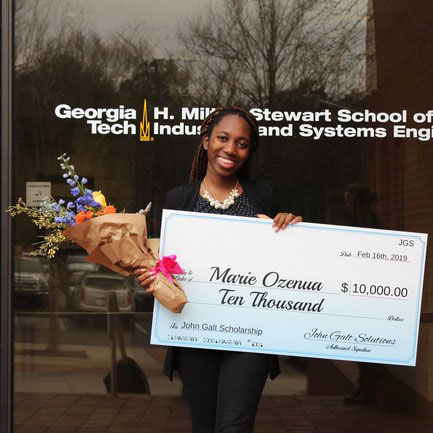Spend a few minutes talking with Marie Ozenua, and you’ll quickly learn that she’s passionate about optimizing systems. The fourth-year, an undergraduate in the H. Milton Stewart School of Industrial and Systems Engineering (ISyE), arrived at Georgia Tech as a computer engineering major but quickly switched to ISyE because of its use of math to improve efficiency.
This past February, Ozenua – who is concentrating her ISyE studies in supply chain – received the $10,000 John Galt Scholarship for Future Supply Chain Leaders and will begin her master’s in supply chain studies as an Amazon Supply Chain Systems Design Fellow through the BSIE/MSSCE program at Georgia Tech this fall.
Ozenua grew up in Nigeria and has an internship this summer with Accenture Strategy, which does considerable development work with a supply chain and technology focus in Africa. She plans to eventually earn a Ph.D. in business with an emphasis on entrepreneurship and technology and intends to take what she’s learned through her academics back to Africa, where startups are essential to the growing economies on the continent. “I want to help startups develop better strategies that will, in turn, help the countries move forward faster,” Ozenua said in a recent conversation, which is featured here.
Your undergraduate research – which won second place in the national IISE Undergraduate Student Technical Paper competition – has an optimization focus. Describe the work you’re doing.
I’m working with ISyE Fouts Family Professor Natashia Boland. Our research focuses on optimizing the daily transportation of warehouse workers to and from the warehouse. We’re looking at it from a worker-centered approach, giving the employees more power to decide if they prefer to drive or just ride to work.
This is important because many warehouse workers are in a lower income bracket and can’t necessarily afford cars for themselves. In addition, warehouses tend to be located in outer urban areas where public transportation is scarce, and ride-shares like Lyft and Uber are expensive. And while warehouses need these employees, they don’t want to relocate because of the benefits these urban areas provide.
So, our research is attempting to provide a solution that helps both the warehouses and the workers. Most of our project relies on multi-objective optimization, which means we consider different factors, such as the workers’ preference for how far they’ll travel to work. We’re also looking at the economic and environmental implications of our research. If more people carpool, for example, that reduces the number of cars on the road and also lowers greenhouse gas emissions.
Why is it important to you to do research as an undergraduate?
You can apply what you have learned in class to real-world situations – situations where people don't necessarily have the answers. So you're creating something new, and you're able to apply this new knowledge and new skills to actually help people.
You’ve participated in three Vertically Integrated Projects. Which was your favorite, and why?
My favorite was a project with Partners for Care, a nonprofit based in Kenya. A nomadic tribe there was having problems with these tiny insects that bore into their feet. My team developed a shoe that the tribe can make with sustainable materials that are easy to find, so the shoes will be inexpensive for them. We got to see videos of the people testing the shoes and see their reactions, which was great.
I particularly liked this project because it was close to home. My dad grew up in the northern region of Nigeria, which has a nomadic culture as well.
Why are you so passionate about supply chain?
Supply chain is how people get stuff, from start to end. Anything you buy in a store, there’s a whole supply chain, and the products you see there are testament to how good the supply chain is. For example, if a product is poor quality, that means something probably happened during its manufacture. If an item is out of stock, that means there’s a problem with the transportation and logistics behind getting it to the store.
When I was growing up in Nigeria, I would see that food in the markets wouldn’t come in quickly, or it wasn’t of good quality when it got there. Or at the hospitals – the drugs doctors need wouldn’t be available. All these little bottlenecks in society could be avoided if there was a proper supply chain.
So for me, it’s about how to solve these bottlenecks so that these systems can actually provide what people need to make their everyday life better.
What does having an international perspective bring to your ISyE experience?
I’m specifically studying how to optimize systems to make things better. Compared to Nigeria, a lot of things are already good in the U.S., so when people here think about optimization, it doesn’t seem like a huge stretch for them.
Coming from one of the world’s developing countries, I can see how optimization can serve millions of people. There’s an urgency there.
